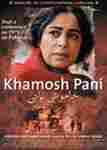Contribute
| Film Review - Khamosh Pani (Silent Waters) |
John Mathew
05/04/2005
Review of Khamosh Pani (Silent Waters) Sabiha Sumar was present for a question and answer session and spoke simply and effectively to the motivations for her film. The story she depicted is all too familiar - it forms, with some creative departure, part of the narrative found in Urvashi Butalia's seminal work, 'The Other Side of Silence - Voices from the Partition of India.' Sumar also spoke of meeting with a woman she believed was abducted. The anthropology of kidnapped women has only recently become the subject of inquiry, now that ghosts too long concealed are finding their moment of exorcism. At such a time, Sumar's effort is both timely and poignant. There is, from the perspective of aesthetics, a danger in the depiction of such a fraught subject of demonising one sex – in this case, men. It is not difficult to do this, particularly when the insidious hand of patriarchy continues to dominate in the region. To Sumar's credit, she has not sought to create merely a place of victimhood for all the women in the film (surprisingly few, with only Ayesha and Zubeida occupying central roles), though the telling of the story cannot but leave the viewer with a sense of outrage and powerlessness alike. Likewise, there are sympathetic men - the barber who stands up to the fundamentalists and arranges for a Sikh pilgrim to be given tea, and another townsman who helps to mediate the meeting between that pilgrim and Ayesha, his long-lost sister. They stand as decent exemplars of humanity in a place where humanity is suddenly up for ransom. In what has been hailed as a pivotal moment in Pakistani cinema, Sumar has made a film, she says, that speaks to the dangers of fundamentalism. This she has done, and in powerful simplicity through the recounting of a tale that recurs time after interminable time, and in its heartbreak calls to us to be more than witnesses - it calls, no demands that we respond, such that where we are, we can give truth to our own yearning plea, 'in our time at least, please, never again.' John Mathew, with input from Tatiana Chaterji Cast: Kirron Kher, Aamir Malik, Arshad Mahmud, Salman Shahid, Shilpa Shukla, Sarfaraz Ansari, Shazim Ashraf, Navtej Johar, Fariha Jabeen, Adnan Shah,
Directed by: Sabiha Sumar
Written by Paromita Vohra
Country: Pak/Fr/Ger
You may also access this article through our web-site http://www.lokvani.com/


